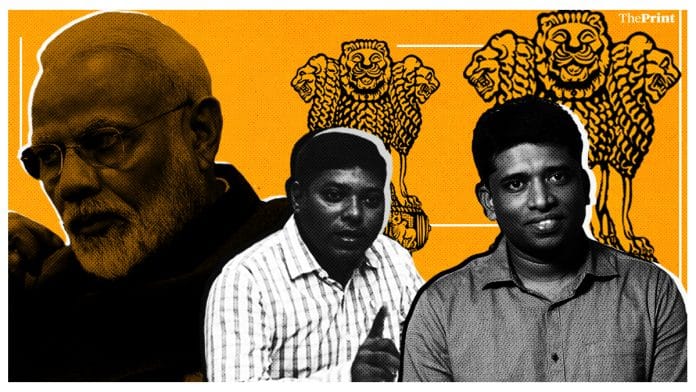Three IAS officers have resigned from the service in the last one month. Kannan Gopinathan, an AGMUT-cadre officer, and Sasikanth Senthil, a Karnataka-cadre officer, resigned over ‘lack of freedom of expression’ and abrogation of Article 370 by the Modi government. Last week, a 2011-batch IAS officer Kashish Mittal resigned after he was transferred to the northeast.
ThePrint asks: IAS resignations: Are civil services losing their charm in Modi era?
Civil services a dream career for millions of aspiring youngsters in India
 Lalit K. Panwar
Lalit K. Panwar
Former IAS officer
I don’t think civil services are losing their charm in the Modi era. This is evident from the fact that more than half a million Indians sit for the UPSC exam every year.
The recent resignations by two young IAS officers — S. Sasikanth Senthil (a 2009 batch Karnataka-cadre IAS officer) and Kannan Gopinathan (former secretary in the power department in Daman and Diu, and Dadra and Nagar Haveli) – surely indicate a kind of disenchantment with the central government. This is something I appreciate. However, it is important to note that these are exceptions.
One must remember the proverb, ‘the exception that proves the rule’. In this case, the rule is that civil services are a dream career for millions of aspiring youngsters in India. It is a profession that offers incredible opportunities and is an effective platform for young talents to help make a difference. Civil services enable them to contribute to nation-building and to administrative management in national sectors that are socio-economically important.
Also read: Modi govt expected to bring stricter resignation rules for IAS, IPS officers
We must respect the decision of these young IAS officers, who have chosen a path that many won’t
 Karan Bir Singh Sidhu
Karan Bir Singh Sidhu
Special Chief Secretary, Government of Punjab
Yes, the civil services — read the IAS — are progressively losing their charm, but it would be fallacious to attribute this to the polity and the style of governance of the Narendra Modi government. Today, young IAS officers are highly qualified and motivated, with specialisation in diverse disciplines. Their 10-15 years of experience in “field” assignments makes their CVs highly attractive in the global job market. These officers may get challenging career opportunities outside the IAS — in the corporate sector, NGOs, personal startups, multilateral institutions and even active politics.
All these alternative career paths are capable of providing these officers a financial security comparable to the civil services. Moreover, the tag of an ex-IAS officer will also help distinguish them from other ordinary applicants, while their batch and cadre network will continue providing them a formal and informal support system.
A few civil servants may have felt restricted by the shackles of the Conduct Rules, especially with regard to freedom of speech, but then these guidelines have not been recently introduced. I feel that we should respect the decision of these young officers, who have chosen a path that many won’t. The IAS, as a service, should embrace them as its “brand ambassadors” in non-traditional fields.
Views are personal
Also read: IAS fraternity divided over officers’ resignations, some call them early ‘warning signs’
IAS officers who want to resign usually go quietly. There’s no need to create tamasha
 Sanjay Dixit
Sanjay Dixit
Additional chief secretary, Rajasthan
In context of the recent resignations by IAS officers, it is not the civil services that have lost their charm in the Modi era. Instead, it seems that the Leftist ideology has no takers now in governance-related matters, making civil servants with such committed ideology uncomfortable. It is very evident that the Left’s heydays are over.
In the case of Kannan Gopinathan from the AGMUT cadre, he was serving as the secretary in power and urban development departments in Dadra and Nagar Haveli and found his prospects of serving in Delhi limited, which is why he resigned. When you are posted in the AGMUT cadre these days, you only get to spend 30-40 per cent of your tenure in Delhi (GNCTD). Moreover, he is trying for a career in politics and is believed to be close to the CPI(M), which is why he made a show of his flood relief work in Kerala with the help of fellow travellers in media.
In the case of S. Sasikanth Senthil, who is a 2009 batch Karnataka-cadre IAS officer, he is reportedly facing a number of corruption charges and was a favourite with the previous government. He is also being investigated because he allegedly used the SC quota to get into the civil services despite not being eligible for it. Therefore, he is trying to make his resignation look virtuous before he actually gets thrown out.
In the case of 2011-batch IAS officer Kashish Mittal, I believe he just wants to stay in Delhi and does not want to be posted in Arunachal Pradesh. This reflects very poorly on him in terms of his commitment to the civil services.
It is important to note that people who want to resign usually go quietly. There is absolutely no need for loud speeches and rhetoric. I also think it is high time that a proper format be devised for resignation of IAS officers. There is no need for this tamasha.
Modi era is characterised by a sense of fear where IAS officers are forced to become propagandists
 T.R. Raghunandan
T.R. Raghunandan
Former IAS officer and Director, Avantika Foundation
It is too early to say that civil services are losing their charm, but if the recent trend of resignations continues, then it will be cause of concern. Of the three recent resignations, two were clearly about conflict of conscience, and the Narendra Modi government should take note of this.
While teaching IAS aspirants in Mussoorie, I have seen that youngsters today are extremely focused and committed. It is a matter of great concern that people are leaving the civil services citing a crisis of conscience.
If there is a disillusionment in the IAS, the Modi government needs to take stock of this.
In the Modi era, there is a huge reliance on IAS officers and sometimes they are preferred over BJP workers, something which was also witnessed during Indira Gandhi’s regime. IAS officers are chosen for key positions based on loyalty and familiarity with the regime. In that sense, it is an extremely centralised system.
The Modi era is also characterised by a sense of fear where IAS officers have been forced to become propagandists and anyone who annoys Modi is chased away, transferred. The character-assassination and backlash faced by the two IAS officers who resigned is ridiculous.
Reasons for resignations may be varied, but they all show that civil services are calling out for help
 Sanya Dhingra
Sanya Dhingra
Special correspondent, ThePrint
For decades, the civil services in India have enjoyed an unparalleled social standing. A share in power, job security, and the possibility of bringing about change have made the profession, particularly the IAS, one of the most coveted in the country.
In the past, people have left civil services for better opportunities in the private sector or to join politics. Unlike the recent resignations of G. Kannan, S. Sasikanth Senthil or Kashish Mittal, in the past, the prospect of more money or more power had made IAS officers resign.
It is too early to call the recent resignations a part of a larger trend, but there are legitimate concerns about these instances giving rise to a culture of “protest resignations”. Disillusionment with the government’s policies, resentment towards an abrupt or unjustified transfer or the reluctance to go and serve in a remote part of the country — the reasons for the resignations may be varied, but they all betray the frustrations and desperation of a system calling out for help.
The political class cannot afford to antagonise or alienate the civil servants. They may be there to execute the decisions of the political party in power, but these officers cannot be reduced to political propagandists or dummies for the government. The political class must responsibly respond to such resignations of IAS officers before they become a trend.
By Revathi Krishnan, journalist at ThePrint







Are civil services losing their charm in Modi era? The charm of the IAS should have been lost on day one after the independence. It was kept alive by vested interests of both the politicians and the IAS themselves. Has anyone seen the pampered BABUs in any developed democracy of the world ? With exceptions they were encouraged to be arrogant, indisplined, corrupt and free-booters so the political bosses could be shielded. The day the political bosses need no protection the charm is gone. Just as the Lutyens and Khan Market is losing its charm so are the Babus. Many Babus had left the service in frustration of different kind in the old days, some are leaving now with a different kind of frustration, what is the big deal ?
The beauty Queens of the past used to become Hawai Sundries and then marry into Political, Babu and India Inc families, wonder how many stewardess of the present are enjoying that. The Dawri in many part of the country was commanded by the position the Babu held, all that is changing. Why blame Modi for it?
Sanjay Dikshit is wrong. Corrupt people will never resign. They want to stick to power by hook or crook. Here the resigned IAS officers true believers of the constitution.
Politicians backed by their iodologies, representing political parities come to power for a tenure, say 5 years, as will of the people. So they are today and not permanently. Whereas, civil service cadre is permanent to serve the country, till their retirement. Politicians interest is to be in power forever, so their main concern is to get elected repeatedly. Also, many of them are not not knowledgeble to comprehend the g r ound realties to take correct decisions in the interest the people. In such a scenario, the NDA-2 Govt. has become arrogant and becoming intorable to guinine protes to their actions, is not democratic but a legacy colonial rule. Unless public protest these tendencies, we would be soon coloni azl rule. The resignations of IAS officers is symptom of a disease, needs to be diognised in time, otherwise it spread to whole body with dire consequences, saying ” prevention is better than cure.
IAS Wapsi gangs are making a show of their resignations, even though they do so for their own selfish reasons.
We listen now a days IAS officers are resigning under pretext of different reasons that to citing “no freedom of speech “, clamp down in Kashmir, etc. Those IAS people resigning are perhaps the smartest people are out to fool all people including intellectuals. Many retd IAS officers are also singing in their tones. These IAS officers resigning don’t know what they are doing. What ever may be their hidden interests and intentions, they don’t know how much country had spent on them to empower them to take such seditious steps? Only animals when they bark they don’t have restrictions on freedom of speech because they don’t live in free,civilised and developed human society. What is freedom of speech? Anything an insane and mad man speaks and shouts at, that is freedom of speech? Sometimes people talk of Democracy and constitution, like undemocratic and unconstitutional? Do they know what they talk of ? When you criticize role of govt in Kashmir, do you put yourself in the shoes of govt? If India dies today, can anyone live? Like a parrot, it was drilled into everyone’s mind in opposition to condemn, criticize and blame govt steps ? Be constructive and appreciate and stand solidly behind govt when it comes to your mother land viz your territory, your land ? Just imagine if some one encroaches your homestead land even by one inch, how you become possessive and live no stone unturned to protect your home property. Take lessons from Japan how they practice “nationalism ” every day to strengthen their mother land forgetting all selfish ends? Sadly in India, from childhood and student life, people don’t know fondly what is importance of nation,nationalism and patriotism. To sensationalise and maximize self publicity these IAS resignees don’t know what is awaiting for them, the curses of 135 crore Indians. Just wait and see God sees through all tricks, techniques and smartness of these shortsighted people? If you want to go, return every pie spent on your education, training,,exposure and experience at public cost? Tax payers money.
What a responsibility shown by the IAS caders. When crores ofpublic money , country’s money looted by one family and friends , not a single IAS resigned. Now when the total world looking at india and it’s inspirational works. These public servants are unable accept the change. Wah what a great persons joined in public service. Shame
4. There is churn, for sure. The balance between the IAS and the other services is being disturbed, although one will not express any opinion on whether this is desirable. The induction of lateral entrants seems to be motivated by something other than tapping into pools of alternative expertise. On foreign policy, becoming difficult to discern whether the diplomatic corps’ views are being given the required weightage. If one ignores the mechanics of governance – in which the IAS is an outsized component – and goes by results and output, the required thrust is not being generated, despite so much ATF being flared. So maybe the system is not in harmony, the way Zubin Mehta’s orchestra is meant to be.
3. One reason the civil service navigates changes of government without undue disruption – in Delhi as well as the better administered states where the extent of politicisation has been kept in check – is that the territory for political executive and permanent civil service is clearly demarcated. Each newly elected government has the mandate to change existing policies. Whether the economy should be opened up to market forces or move deeper to protectionism is the political leader’s call. A Secretary in an economic ministry would be failing in his duty if he did not make out a persuasive case for deep structural reform. However, if that is not the government’s desire, he would follow its philosophy and there is no reason for him to resign in protest, as a minister in similar circumstances would be required to.
In states like UP and Bihar, the IAS has a value and salience that it does not in Maharashtra or Gujarat. These are commercial centres with many more opportunities in the private sector, business, professions. Children of mandarins rarely follow their parents into the civil service. At different stages of an officer’s career, occasions arise for a rewarding switch out of government. However, for a civil servant to resign on a point of protest / principle is rare. 2. It is possible that there are specific reasons in each instance and it is pure coincidence that three cases have got bunched together in a month. However, it would be wrong to dismiss these cases out of hand. This is a well set system, going back to Sardar Patel’s time. It is not meant to be shaken at the roots with each change of government.
Modi Govt does not know the value of economists, IAS officerd